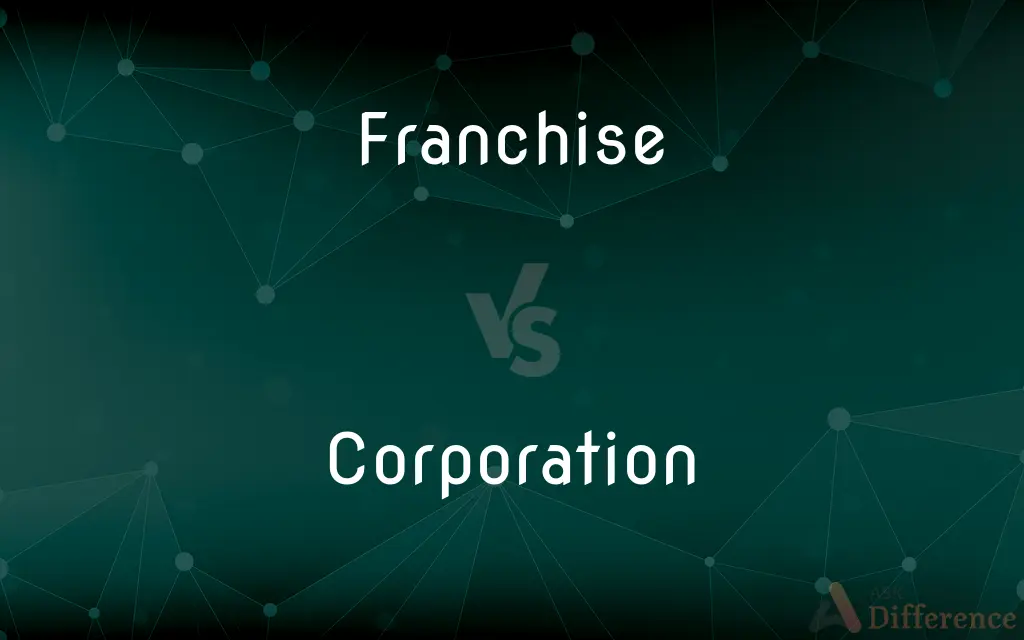Franchise vs. Corporation — What's the Difference?
By Urooj Arif & Maham Liaqat — Updated on April 24, 2024
A franchise is a business model where individuals buy the rights to operate under a brand's name and system, whereas a corporation is a legal entity that is separate from its owners and offers limited liability protection.

Difference Between Franchise and Corporation
Table of Contents
ADVERTISEMENT
Key Differences
A franchise operates under a specific business arrangement where the franchisor grants a franchisee the rights to use its brand, operational system, and resources for a fee. This enables franchisees to start a business under a recognized brand with established procedures and support. On the other hand, a corporation is an independent legal entity formed under state law that can own assets, incur liabilities, sue or be sued, and is owned by shareholders.
The relationship in a franchise involves ongoing support and regulation by the franchisor, including marketing, training, and operational guidelines. Franchisees pay initial fees and ongoing royalties. Conversely, corporations focus on governance structures and shareholder relationships, with no dependency on a franchisor. Corporations may issue stock and are required to hold regular meetings and maintain records to comply with legal standards.
Franchises are often part of a larger network and must adhere to uniform standards across all locations, which ensures consistency but limits autonomy. Corporations, while they can franchise their business model, primarily have the freedom to make independent decisions and changes as directed by their board and shareholders.
In terms of legal structure, franchises can operate within various forms of business entities, including corporations. However, the franchise itself is not a legal entity but rather a method of expanding a business. Corporations, whether public or private, have a legal identity separate from their founders and shareholders, which provides limited liability protection.
From a tax perspective, franchises pay taxes on income as determined by their business structure (which can be a corporation, partnership, or sole proprietorship), including fees paid to the franchisor. Corporations face double taxation if they are structured as C corporations, taxing both corporate income and dividends paid to shareholders.
ADVERTISEMENT
Comparison Chart
Definition
Business model granting rights to sell products/services under a brand
Legal entity separate from its owners
Key Characteristics
Uses brand and system of franchisor, pays fees and royalties
Can issue stock, limited liability, regulated governance
Autonomy
Limited by franchisor’s standards and controls
High, especially in strategic decision-making
Legal Structure
Can be part of any business entity, not a separate legal entity itself
Independent legal entity
Taxation
Depends on the entity type, includes royalties and fees
Subject to corporate taxation, possible double taxation
Typical Purpose
Expansion of a business through third-party operators
Separation of ownership and management, liability protection
Compare with Definitions
Franchise
A business that operates under the name and operational system developed by another company.
Many convenience stores operate as franchises.
Corporation
A business entity that can issue stock and is owned by shareholders.
The tech startup grew and eventually became a large corporation.
Franchise
A business model that includes franchisor support and brand sharing.
Franchises often receive training and ongoing support from the franchisor.
Corporation
A legal entity separate from its shareholders with its own rights and responsibilities.
The corporation entered into an international agreement.
Franchise
A right granted to an individual or group to market a company's goods or services within a certain territory.
He opened a fast-food franchise in his hometown.
Corporation
A firm that is established as a separate legal entity for business purposes.
The corporation has the right to sue and be sued.
Franchise
The authorization given by a league to own a sports team.
The city was awarded a new professional baseball franchise.
Corporation
A company or group of people authorized to act as a single entity and recognized as such in law.
The corporation was registered in Delaware.
Franchise
A privilege or right officially granted to offer specific services or activities.
The postal service franchise remains lucrative.
Corporation
An organization with a distinct legal identity from its members.
As a corporation, the company enjoys certain tax benefits.
Franchise
A privilege or right granted by law, especially the right to vote in the election of public officials.
Corporation
A corporation is an organization—usually a group of people or a company—authorized by the state to act as a single entity (a legal entity recognized by private and public law "born out of statute"; a legal person in legal context) and recognized as such in law for certain purposes. Early incorporated entities were established by charter (i.e.
Franchise
A special privilege given by government to a corporation or an individual to engage in a particular activity using public facilities, especially to provide a public service such as transportation or communications.
Corporation
An entity such as a business, municipality, or organization, that involves more than one person but that has met the legal requirements to operate as a single person, so that it may enter into contracts and engage in transactions under its own identity.
Franchise
The establishment of a corporation, including the granting of certain privileges such as exemption from individual liability for the acts of the corporation.
Corporation
Such a body created for purposes of government. Also called body corporate.
Franchise
Authorization granted to someone to sell or distribute a company's goods or services in a certain area.
Corporation
A group of people combined into or acting as one body.
Franchise
A business or group of businesses established or operated under such authorization.
Corporation
(Informal) A protruding abdominal region; a potbelly.
Franchise
A brand name under which a series of products is released.
Corporation
A body corporate, created by law or under authority of law, having a continuous existence independent of the existences of its members, and powers and liabilities distinct from those of its members.
Franchise
The territory or limits within which immunity, a privilege, or a right may be exercised.
Corporation
The municipal governing body of a borough or city.
Franchise
A professional sports team.
Corporation
(historical) In Fascist Italy, a joint association of employers' and workers' representatives.
Franchise
To grant a franchise to.
Corporation
A protruding belly (perhaps a play on the word corpulence).
Franchise
The right to vote at a public election or referendum; see: suffrage, suffragette.
Corporation
A body politic or corporate, formed and authorized by law to act as a single person, and endowed by law with the capacity of succession; a society having the capacity of transacting business as an individual.
Franchise
A right or privilege officially granted to a person, a group of people, or a company by a government.
Corporation
A business firm whose articles of incorporation have been approved in some state
Franchise
An acknowledgment of a corporation's existence and ownership.
Corporation
Slang terms for a paunch
Franchise
The authorization granted by a company to sell or distribute its goods or services in a certain area.
McDonald’s has exported its franchise.
Franchise
A business operating under such authorization, a franchisee.
Franchise
A legal exemption from jurisdiction.
Franchise
The membership of a corporation or state; citizenship.
Franchise
The district or jurisdiction to which a particular privilege extends; the limits of an immunity; hence, an asylum or sanctuary.
Franchise
(sports) The collection of organizations in the history of a sports team; the tradition of a sports team as an entity, extending beyond the contemporary organization.
The Whalers' home city of Hartford was one of many for the franchise.
Franchise
The positive influence on the buying behavior of customers exerted by the reputation of a company or a brand.
Franchise
The loose collection of fictional works pertaining to a particular fictional universe, including literary, film, or television series from various sources, generally when all authorized by a copyright holder or similar authority.
The Star Wars franchise
Franchise
Exemption from constraint or oppression; freedom; liberty.
Franchise
(obsolete) Magnanimity; generosity; liberality; frankness; nobility.
Franchise
(transitive) To confer certain powers on; grant a franchise to; authorize.
Franchise
To set free; invest with a franchise or privilege; enfranchise.
Franchise
Exemption from constraint or oppression; freedom; liberty.
Franchise
A particular privilege conferred by grant from a sovereign or a government, and vested in individuals; an immunity or exemption from ordinary jurisdiction; a constitutional or statutory right or privilege, esp. the right to vote.
Election by universal suffrage, as modified by the Constitution, is the one crowning franchise of the American people.
Franchise
The district or jurisdiction to which a particular privilege extends; the limits of an immunity; hence, an asylum or sanctuary.
Churches and mobasteries in Spain are franchises for criminals.
Franchise
Magnanimity; generosity; liberality; frankness; nobility.
Franchise
To make free; to enfranchise; to give liberty to.
Franchise
An authorization to sell a company's goods or services in a particular place
Franchise
A business established or operated under an authorization to sell or distribute a company's goods or services in a particular area
Franchise
A statutory right or privilege granted to a person or group by a government (especially the rights of citizenship and the right to vote)
Franchise
Grant a franchise to
Common Curiosities
What is the difference in operational control between a franchise and a corporation?
Franchises operate under strict guidelines set by the franchisor, while corporations have more freedom to make independent business decisions.
What is the primary advantage of a franchise?
The main advantage is operating under a well-known brand with established systems and support.
What is the key benefit of forming a corporation?
It offers limited liability protection to its owners and facilitates easier access to capital through the sale of stock.
Can a corporation own a franchise?
Yes, a corporation can purchase and operate a franchise just like any other business entity.
How are franchises taxed compared to corporations?
Franchises are taxed based on their business structure, while corporations are taxed at the corporate level and may face double taxation on dividends.
Is a franchise a separate legal entity?
No, the franchise itself is not a legal entity but a type of business agreement.
What is the role of shareholders in a corporation?
Shareholders invest capital in the corporation and have rights to vote on major decisions and receive dividends.
How does the investment differ for starting a franchise vs. a corporation?
Franchises generally require a franchising fee and ongoing royalties; starting a corporation may involve different capital depending on the business scope.
Can a franchise be part of different types of corporations?
Yes, franchises can operate within S corporations, C corporations, or any other corporate form.
What are examples of franchise businesses?
Fast food restaurants, hotel chains, and automotive service centers are common examples.
What legal protections do corporations offer that franchises do not?
Corporations provide limited liability protection to their owners, separating personal assets from business liabilities.
What are the common requirements for both franchises and corporations?
Both require compliance with specific legal and operational standards, but franchises also follow franchisor rules.
How does one become a franchise owner?
By purchasing the rights to open and operate a business under the franchisor's model and agreeing to adhere to their system and pay associated fees.
What are the typical responsibilities of a corporation's board of directors?
The board oversees the corporation's management, sets broad policies, and makes significant decisions.
Why might a business choose to operate as a franchise rather than starting a new corporation?
Operating as a franchise offers brand recognition, established customer base, and operational support which might be more challenging to develop independently.
Share Your Discovery

Previous Comparison
Tributary vs. River
Next Comparison
Filgrastim vs. LenograstimAuthor Spotlight
Written by
Urooj ArifUrooj is a skilled content writer at Ask Difference, known for her exceptional ability to simplify complex topics into engaging and informative content. With a passion for research and a flair for clear, concise writing, she consistently delivers articles that resonate with our diverse audience.
Co-written by
Maham Liaqat













































